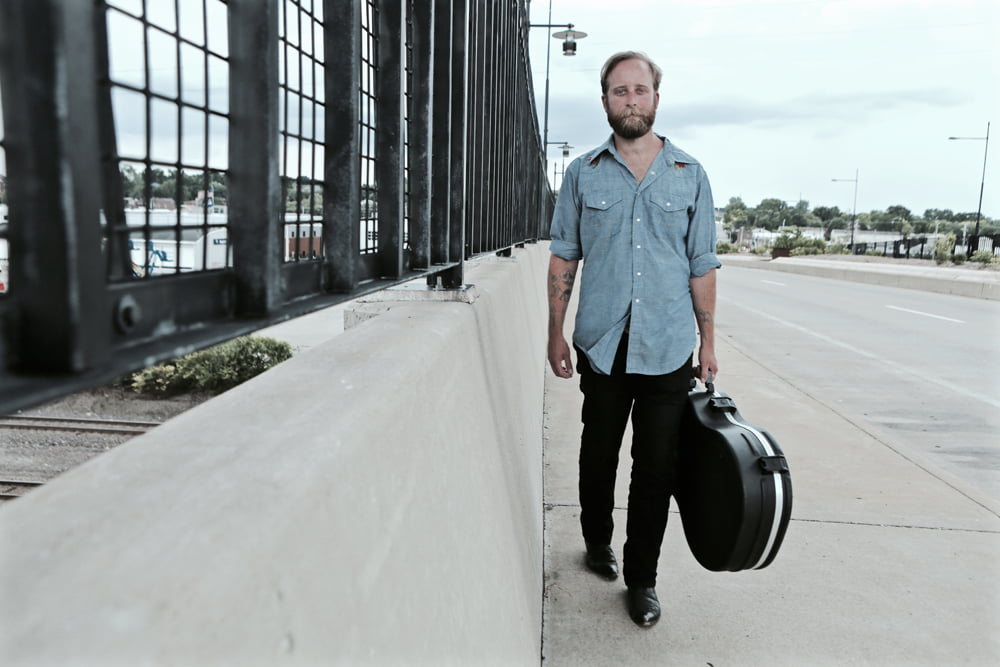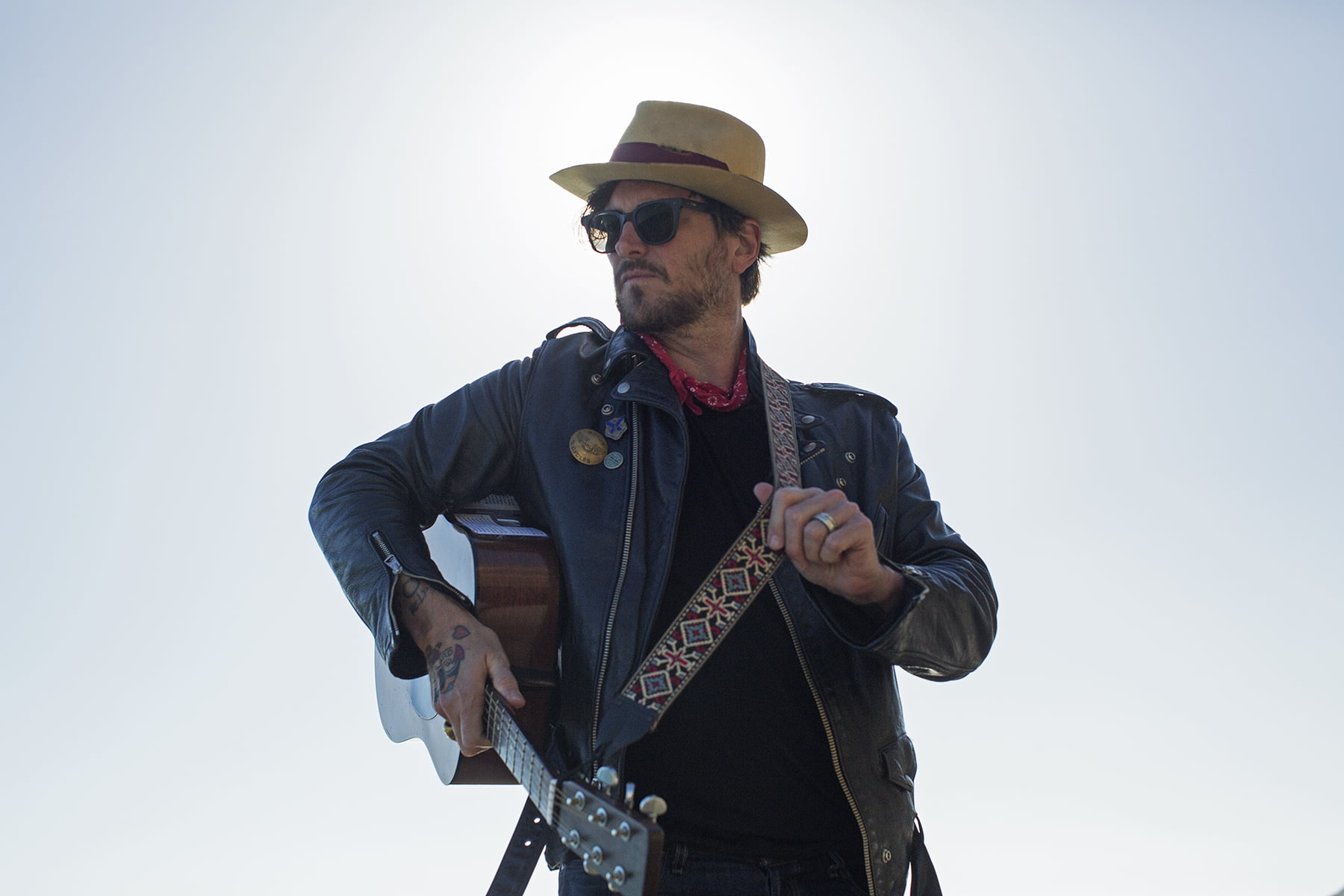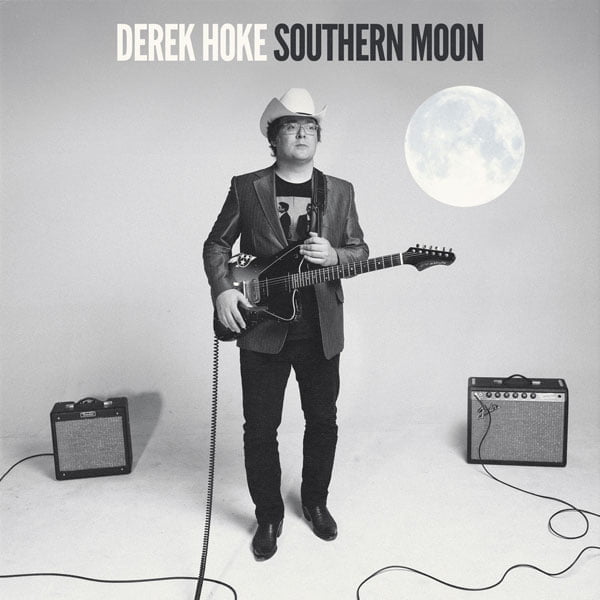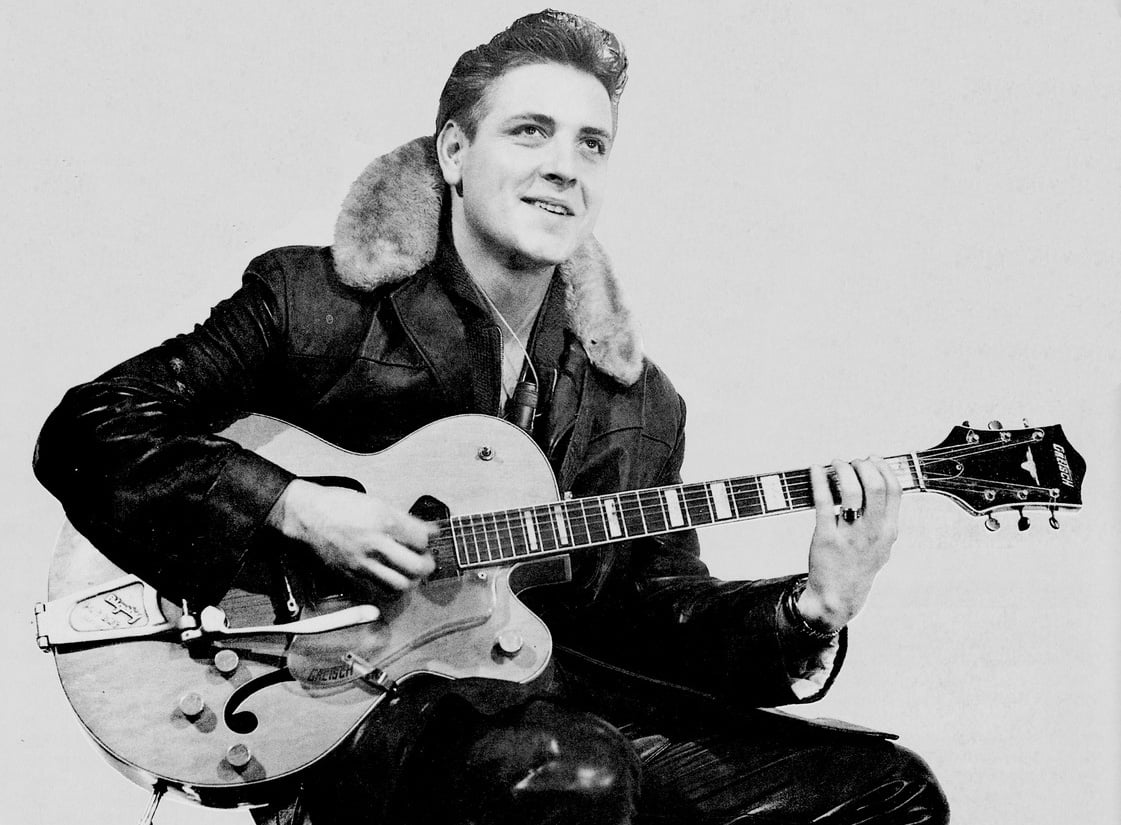Butch Walker has never been an artist you could pick out of a song or a record based upon a particular sound. The Georgia native and Grammy Award-nominated songwriter, performer, and producer has stamped his name in the liner notes of albums from Weezer and Taylor Swift to P!nk and Fall Out Boy. But Walker’s range as an artist (and, in many cases, a producer) is most evident in his own catalog, where he’s as liable to show up and rock the hell out as he is to deliver a quiet, introspective folk gem. His latest effort, Stay Gold, is a rock album that shows its country tendencies from time to time, oozing with nostalgia and railing through the kinds of lyrics you might find yourself doodling on notebooks.
I have to say, especially being from Atlanta, I love “Stay Gold,” the song. There’s a ton of imagery in there that seems like it must transcend the specifics, though, and kind of mean something to everyone.
Thank you. I think it was probably one of the first songs I put together for the record. The whole thing was this almost Outsiders thing that I just felt like I related to as a kid. I was definitely not the popular kid in school. I was the long-haired derelict that all the yuppies looked at funny. When I saw that movie, when I was young, it made a lot of sense to me. I appreciated the kids that came from nothing, that had more substance almost than any of the gifted and the popular ones. I guess I just really started running with that. Also, growing up in [what was] then kind of a boring, deadbeat, Christian conservative Bible belt town, where hardly anybody played or cared about rock 'n' roll, because I think their parents scared them away from it.
I had a couple of friends that I could relate to. They didn’t come from the best homes. There were definitely problems there, no dads around and whatever. I wrote a lot of “Stay Gold” about one of my buddies when I was young, that I used to hang out with all the time and listen to rock 'n' roll records. We’d dream and fantasize about being in a metal band together and stuff. I think a lot of people can relate, that come from a small town, to the mentality there of disenfranchisement.
I saw a quote from you recently where you said that the songs are half-true on this record. I was wondering what you mean by that. Is that something that’s common, or the way you feel about a lot of your songs … what do you mean when you say that?
I think so. I think a song will start with something that is something I’ve related to or that has happened in my life, or to somebody else’s life that I grew up with or whatever. A lot of times, to complete the picture, I’ll start thinking in broader terms — almost, like I said, in a cinematic kind of a way. "Why does this happen to the character? Who says this has to always be fucking true?"
I don’t believe that it’s inauthentic if it isn’t true. Half my favorite singers and songwriters growing up, I think, wrote fiction. It’s about entertaining and making people enjoy what’s being talked about and relate to it however, or feel something from it.
One of the lyrics on the record that really hit me hard was, “I just hope you worry about me every once in a while,” from “Descending” with Ashley Monroe. I find myself thinking back to that line a lot. Is there something specific that made you think about it that way? It’s a very different take on “I hope you miss me,” or “I hope you wish we had never …”
That line stood out in the back of my mind. Who knows? I could have just been driving down the road or something. I could have been thinking about love and how hard it is to hold onto it, and how hard it is to constantly be in love and feel for someone.
I’m not saying that I’m the one necessarily saying that [line]. It could be the other person. “I wonder if that person thinks I never worry about them anymore — that I never check in on them because I just don’t care anymore.” That’s a fucked-up way to think, but at the same time, it’s a reality. The candle burns out for a lot of people. It’s really sad. I really wanted to write that song with Ashley: “What’s one of the saddest things you can say in a plea of desperation — wanting someone to still love you when you think they don’t anymore?”
I sent that to Ashley. She was on a plane texting, coming to L.A. We wanted to get together and talk about a song. I said, “Yeah, I’d love to do that.” We got to talking about relationships, and blah, blah, blah. We weren’t even talking about the songwriting anymore, we were just talking about having relationship struggles and being in love.
She said, “We’re descending.”
I said, “Your relationship or the plane?”
She said, “Oh no, the plane. I’m sorry.” I wrote her back like 10 minutes later: “I think we have our song.” I wrote this chorus and texted it to her right in the middle while she was still flying. We got together and she helped write the rest of the verses and we finished it in 10 minutes.
Wow, that’s a cool story. You work with a lot of other artists on other records, and I don’t think I could tag what sound to expect from a record with you in the credits. I was wondering, what is it about a project that will draw you to it?
I think you’re right. I consider that to be a good thing … that you never know.
Absolutely.
It’s weird. You come to [music], growing up on rock and metal and stuff like that — I was producing rock and metal bands in my mom and dad’s garage in my 20s. Then, you go from that to having kind of an out-of-nowhere fluke hit for a teenage pop girl and then, all of a sudden, everybody’s like, “Oh yeah, he’s the teeny pop girl.” You’re like, “No, I’m not really. I didn’t know this was even going to happen. It just happened.”
Then, you’re getting hit at left and right to produce and write for every teeny pop girl in existence. It’s like, “Wait a minute: I don’t know if I want to be pigeonholed for one thing. That doesn’t make any sense to me.” I grew up in so many different kinds of music, and I love so many different things, that it’s not fair to myself just to take [projects] because the money’s good.
I just wanted to do something interesting. I’m obviously doing something I’ve never really tapped into before, but I’m familiar with. That always is intriguing to me. I think someone like Rick Rubin has had a great career of doing that, too, where he might not be as hands-on, musically, as I am, but all producer roles are different. His is just as important, which is kind of being the moderator for the bands, or being a shrink for the artists, or being a big-picture kind of a Yoda character.
That’s awesome, because he can go from making the best Dixie Chicks record of their career, to making the best Johnny Cash record, to making the best Slayer record. That rules. I love all that shit. I love all three of those artists. For anybody to tell me that, “No, you’re just a pop/punk guy,” or “No, you can’t do that. Don’t change up the ingredients to the Egg McMuffin on me.” I don’t like it when people try to do that — try to tell you that you’re one thing. How can that be, when I grew up on everything from Duran Duran to Willie Nelson to Celtic Frost and fucking Bruce Springsteen and Bon Jovi? It was everything. It was whatever was on the radio I listened to. Back then, there was no separation. You could hear every kind of music over the course of two stations.
That’s all I knew, growing up in a small town. It was before there was the Internet, and pretty much a lot of it was before there was MTV — which, I’m dating myself, but that just made it more interesting. I was soaking up music like a sponge. The most fun thing about being an artist and a producer now, and having this day job that I have, is being able to exercise all those influences.
Definitely. You’ve been in the producer’s role a lot, self-producing this record, as well, but you haven’t chosen to self-produce all of your records. Ryan Adams produced your last full-length. What pushed you toward the producer’s role this time around?
The thing is, I definitely didn’t know, on the previous record, what I wanted. I didn’t really know what I wanted, just because I was kind of emotionally numb from my dad dying. I had all these strong lyrics — more importantly just lyrics — for songs that I thought would be really great songs, but I didn’t know how to do them. I didn’t really have any confidence, because the wind was let out of my sails, to go in and try to spearhead it myself.
Ryan, at the time, was just the best timing in the world to have somebody come in and go, “I know what this needs to be.” I think he nailed it, and I think it’s exactly what it should have been. If it had been some big, bombastic, rock 'n' roll record with lyrics about my dead dad, I think that would have been stupid. It wouldn’t have worked. It needed to be this thing that was delicate. It needed to be fragile. It needed to be treated with kid gloves, and I don’t know if I would have done that, if left to my own devices. I needed to have somebody steer the ship and keep the music at bay and let the lyrics and vocals be what mattered the most on that album.
Then, I came out from that tour [that followed], which was a great tour and very cathartic. I processed and medicated a lot on that tour about his death, from the stage and the microphone, off stage, with other fans. A lot of people, after the shows, would come up and be crying because they’d just lost their dad or mom or something. I would see these fans that had been coming to see me play for 10 to 15 years or more, crying on my shoulder afterward. It was super-cathartic and super-medicating. I felt great after that tour because everybody got to get something out of it other than just getting drunk and fucking and screaming and partying. It was like a different kind of therapy.
I love the shows where it’s the other end of the spectrum of therapy, too. Let’s just fucking have a laugh and have a scream and leave sweaty and covered in confetti. That’s awesome. At the same time, this needed to happen in my life, and I’m glad it did. When I came out from that, the songs I started writing for Stay Gold were anything but Afraid of Ghosts. They were very celebratory and kind of anthemic and nostalgic. It just triggered a lot of memories for me that were good memories, after coming out from that, of my youth.
I guess what I’m trying to say is that I had a vision for this record. It made sense for me to produce it, because I knew exactly what I wanted to do on this one. We both [Walker and Adams] actually kind of conceptualized this record together. I guess, in a way, he executive produced it, because he knew exactly what I needed to do, and I knew exactly what I wanted to do. It just made sense for me to do it myself.
For more on thoughtful, genre-blurring singer/songwriter/producers, check out our conversation with M. Ward.
Photo credit: Noah Abrams





